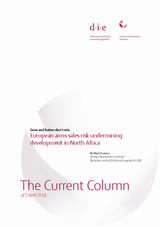Guns and butter don’t mix
European arms sales risk undermining development in North Africa
Furness, Mark / Annabelle HoudretThe Current Column (2019)
Bonn: German Development Institute / Deutsches Institut für Entwicklungspolitik (DIE), (The Current Column of 8 April 2019)
Bonn. 8 April 2019. Since the 2011 Arab uprisings, European countries have supported development and stability in North Africa with increased aid and increased arms sales. This incoherent approach risks fuelling further conflict. In the eight years since the 2011 ‘Arab Spring’ uprisings, European countries have consistently said they want to support both development and stability in North Africa. They have done this with a mixture of material support for authoritarian governments – including massive increases in arms sales – and increased official development assistance (ODA). The two approaches are incoherent with each other and risk fuelling further conflict. Economic and social development depends on stability, but is also crucial for supporting it. Development can provide employment, resources and a meaningful life to people, and aid budgets have been justified by the argument that development will help people decide to stay in their home countries rather than migrating to Europe. Since the Arab uprisings, total ODA commitments from the ‘big four’ EU donors – France, Germany, the United Kingdom and the European Institutions – to Algeria, Libya, Morocco and Tunisia increased from around USD 2 billion in 2008 to more than USD 3.2 billion in 2017. This aid has been complemented by other approaches to support development, including EU efforts to deepen trade ties with Morocco and Tunisia. These efforts risk being undermined by Europe’s increasing arms sales to Maghreb countries. EU member countries are major exporters of weapons to Algeria, Libya, Morocco and Tunisia, accounting for around 25 percent of their arms supplies between 2008 and 2017. According to a recent report by the Swedish research institute SIPRI, these four countries buy 75 percent of all weapons exported to Africa, a rise of 20 percent between 2009-2013 and 2014-2018. These weapons exports are inherently destabilizing. A closer look at three Maghreb countries reveals an example where things went wrong, a country at the tipping point, and a potential success story. The United States, Russia, Italy and France considerably increased their arms sales to Libya’s Gaddafi regime in its last years. When Gaddafi fell following military intervention by some of those same suppliers, Libya was left with massive stockpiles of weapons and well-armed, battle-hardened militias. In 2012 there was a major spillover of both weapons and fighters into Sahel countries, fuelling the conflict in neighbouring Mali. Nevertheless, European countries continued to supply arms to Libya, and, since 2014, not only to the internationally-recognised Western government but also to its Eastern rival. These weapons have been used by the Eastern Libyan General Hafter in his military campaign to take control of the country’s south. The Libyan example illustrates the fact that when you sell a country weapons, you cannot control where they will end up. Algeria is the biggest arms importer in Africa, accounting for 56 percent of African imports of major arms in 2014–18. Russia is by far the largest supplier, but France, Germany, Italy, the Netherlands, Sweden and the United Kingdom have all sold weapons to Algeria since its authoritarian crackdown on protests in 2011. Algeria is, by far, the German armaments industry’s largest customer. The current crisis has prompted the overdue resignation of President Bouteflika, but may still lead to conflict in the country if the protests are again crushed. Algeria’s largely ungoverned southern region and abundant oil and gas resources provide ample opportunities for smugglers and local warlords. The prospect of destabilization in another Maghreb country awash with arms poses a real and present danger, including for its neighbours. Tunisia has also purchased more weapons, although not to the same extent as Algeria or Gaddafi-era Libya. Rather, it has received large amounts of aid in support of its democratic transition process, especially from Germany (around USD 750 million in 2017) and the EU institutions (around USD 1350 million in 2017). Although Tunisia’s democracy is faltering, the country nevertheless offers indications that a different approach might work better. The institutions and processes supported by democratic transition funds are intended to lay the foundations for the peaceful reconciliation of interests. Furthermore, the ‘Deep and Comprehensive Free Trade Agreement’ currently being negotiated with the EU has the potential to make a huge difference to Tunisians’ everyday lives, such as through increased agricultural exports and visas. Europeans need to continue to support Maghreb countries with ODA and other forms of development cooperation, both for building critical infrastructure and for helping with the delicate process of reforming state-society relationships. But aid can only contribute to development and long-term stability when arms sales, where necessary at all, at least conform to the EU member states’ own ‘common rules governing control of exports of military technology and equipment’ from 2008. These require taking into account the human rights situation and other criteria in the buyer’s country. It makes little sense to invest millions in development aid while expanding the weapons business, virtually without conditions.



